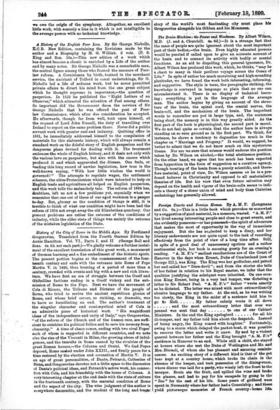The Brain-Afachiste: its Power and Weakness. By Albert Wilson, M.D.
(J. and A. Churchill. 4s. 6d.)—It is a strange fact that the mass of people are quite ignorant about the most important part of their bodies,—the brain. Even highly educated persons would be puzzled if called upon to give an accurate account of the brain and to connect its activity with bodily or mental functions. As an aid to dispelling this general ignorance, Dr. Albert Wilson has produced this work, which, he thinks, "may be a chart to many in their perilous voyage across the Ocean of Life." In spite of rather too much moralising and high-sounding platitudes, we have found the work both interesting, informing, and suggestive. The style is terse, the paragraphs striking, the knowledge is conveyed in language so plain that no one can misunderstand it. There is no display of technical learn- ing ; everything is put in the language of the average man. The author begins by giving an account of the struc- ture of the brain, the spinal cord, the cranial nerves, the brain-cell, and the mechanism of the brain. The important words to remember are put in large type, and, the sentences being short, the memory is in this way greatly aided. As the first part of the book is physiological, the second part is moral. We do not feel quite so certain that the author here is always standing on so sure ground as in the first part. We think, for instance, he shows a tendency to dogmatise too much in the chapter on " Marriage and Progeny." It would, we suggest, be better to admit that we do not know much on this mysterious theme. Nor are we sure that science would endorse the position taken by Dr. Wilson on alcohol,—the total abstinence position. On the other hand, we agree that too much has been expected from hypnotism in the form of suggestion as a curative agency. Though treating of the brain from a purely scientific, and there- fore material, point of view, Dr. Wilson assures us he is a pro- found believer in Christianity and opposed to all materialistic theories of life. But his view that even future salvation may depend on the health and vigour of the brain-cells seems to indi- cate a theory of a closer union of mind and body than Christian eschatology has generally allowed.






































 Previous page
Previous page